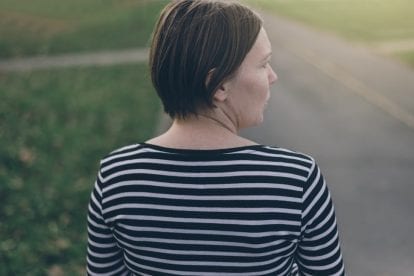Where You End and I Begin: An Interview With Alan Massey on Addiction, Codependency, and How Families Can Heal

Love is one of nature’s most powerful forces. It can protect us from pain and leave us acutely vulnerable to suffering. In love, we can find strength we didn’t know we had, joy we didn’t know was possible, and sorrow whose depths we could not have imagined. Love is what propels us forward, makes us want to be better, makes the struggle of life worth it. But when the person we love is an addict, love sometimes makes us complicit in the addiction through codependency.
Codependency is one of the most commonly talked about concepts in the recovery community. It can also be one of the most confusing to understand and painful to acknowledge. For a deeper look into codependency, its effects on families, and how it can be overcome, I turned to Alan Massey, Family Program Director and facilitator of both the 4-day Family Program and the 4-day Codependency Workshop at Alta Mira.
“Carrying, Not Caring:” Understanding Codependency
One of our most natural instincts is to protect those we love from harm. This desire is so elemental that it is part of what defines our humanity. Often, protection is simple—you buckle your child’s car seat correctly, you provide emotional support to a friend after a divorce, you act as your parents’ designated driver after they celebrate their anniversary with dinner and a few glasses of wine at a restaurant.
But when the person you want to protect is an addict, protection becomes a messier prospect. This is particularly true if your own feelings of self-worth are dependent on the approval of the addict or you fear the loss of affection, contact, or love. This complex combination of love, fear, and an overwhelming desire to shelter both yourself and your loved one is the genesis of codependency. As Alan says:
“Codependency is the shadow side of caring, and a shadow side of loving. It’s a way of becoming a people-pleaser and approval seeker, instead of trying to get people to straighten out. It becomes the dysfunctional side of caring that gets people locked into being over-responsible and losing touch with their authentic selves.”
As a result, many people in a relationship with an abuser of drugs or alcohol bend over backward to appease and protect their loved one. You might:
- Make excuses for them to shelter them socially or professionally
- Give them money when they have squandered their own on their addiction
- Bail them out of jail
- Take the blame for destructive or criminal acts they committed while under the influence
You might do these things because you are afraid that if you resist or don’t take responsibility for them:
- They’ll push you out of their life
- You’ll drive them towards even riskier behavior and more dire consequences
- They’ll stop loving you
Codependent behavior is a desperate attempt to take control over the uncontrollable.
In reality, codependency does not offer protection for your loved one and only serves to enable their addiction further by allowing the consequences of their addiction to stay hidden. But codependency is blinding; your overwhelming desire to please and protect coalesces with your unbearable fear of criticism, conflict, and abandonment and impairs your ability to recognize the destructive nature of your behavior. Identifying the exact point at which compassion becomes codependency can be a difficult process even for the most self-aware loved ones of addicts. As Alan explains, “There is a continuum from caring to carrying.” Recognizing codependency requires looking for “a pattern of behavior” in which ostensibly loving actions are in fact perpetuating addiction.
We're Here to Help. Call Today!
866-922-1350A Shared History
Addiction and codependency are intimately related phenomena. Alan believes they come from the same petri dish, born from shame and fear-based family dynamics or formative experiences. The inability to feel good about yourself without an external influence becomes the driving force for both the addict and their loved one; the addict turns to alcohol and drugs while the codependent desperately seeks solace in the approval of others, including the addict they are enabling. Neither the addict nor the codependent has a true sense of self: as Alan puts it, “either they aren’t sure if they even have a self, or they regard the self they have with no confidence or esteem.” A cycle of destructive behavior ensues, in a seemingly unbreakable pattern. But it doesn’t have to be this way.
Understanding and Reclaiming the Sense of Self
The recovery process for codependent family members begins with acknowledging the true nature of your behavior. You must come to the understanding that your actions are hurting both your loved one and yourself, a realization that can be profoundly difficult, disorienting, and distressing. Coming to the simple but profound understanding that the codependent is not to blame for the behavior any more than the addict is responsible for the codependent’s can be a struggle—too often both blame the other for their attitudes and actions. The result is an ongoing power struggle in which each helps the other to stay stuck. But when this moment of clarity occurs, it is critical that you receive the support you need to cope with the emotional impact of awareness and make meaningful change.
“Family members need a lot of healing, validation, a sense of reconnecting with themselves in a way that they cannot in the frantic, fear-filled preoccupation with their addict. They can use some serious help right away.”
At Alta Mira, the Family Program was designed to provide a safe space where family members can explore their experiences with addiction and codependency to gain a deeper understanding of themselves and their relationships. With the guidance of compassionate clinicians who specialize in supporting the loved ones of addicts, you can engage in a transformative process of self-discovery to move forward with newfound confidence and resiliency. Alan describes four primary moments that most often serve as ‘wake-up calls,’ alerting the loved one to their codependency, and helping families begin the process of healing:
- Identifying your own pain separate from the struggles of the addict. Giving voice to your own “anguish, fear, resentment, anger, and hopelessness” allows you to not only gain invaluable insight into your own experience, but to conceptualize yourself as a separate entity from the addict with your own unique emotions, hopes, and struggles. Here, you can begin to plant the seeds to break through codependency.
- Understanding that they are dealing with a disease, and that they can’t wish it away. Having a clear understanding of the nature of addiction is a critical piece to transforming your emotional and behavioral responses to your loved one; you cannot end someone else’s addiction. As Alan explains, “You are not going to get reasonable or mature behavior from a pre-recovery addict. It’s not a choice for the addict.” Having unrealistic expectations of your loved ones stifles healing and only deepens your pain.
- Hearing from other people who have been here. The Family Program brings together family members who share the struggle of addiction and codependency, to foster a sense of community and allow you to share experiences, wisdom, and camaraderie. Connecting with others who know what you are going through, and knowing that you are not alone, can be a powerful and healing experience.
- Being asked for honest evaluations. One of the most vital aspects of recovering from codependency is honestly examining the impact of your behavior by asking “How’s that working out?” Did paying your child’s bills work? Did hiring your husband a lawyer work? Did bailing your wife out work? Has anything changed? The answer is almost always “no”—and finally saying that “no” aloud can bring stark clarity.
Within a supportive community of compassionate clinicians and peers, you can begin to explore paths to developing healthy and positive behaviors that allow you to move away from codependent carrying and toward true caring. But it all starts with one realization: self-worth does not depend on external influences. The emptiness that is desperate to be filled with substances or with the approval of others needs to be filled instead with self-worth and self-validation.
Begin Your Recovery Journey Today
866-922-1350Toward Lifelong Recovery
To truly help an addict, you must first help yourself, and that means establishing a sense of self that honors your inherent worth. It means forging an identity that is distinct from your loved one, creating boundaries to protect yourself, and reaching ever-deeper levels of self-awareness to allow your authentic self to flourish. It also means recognizing your limits and relinquishing the desire to control the uncontrollable. As Alan says, “You’re only tasked with doing the best you can—you’re not in control of the results. Be able to live with yourself whatever the result.”
Recovery and personal growth for codependents is a lifelong process that requires continuous re-commitment to resisting damaging behaviors within relationships and ensuring that you nurture your own needs in positive ways. Alta Mira’s Family Program can help you lay the foundation for ongoing healing by giving you the tools you need to build a richer, healthier life. Alan has seen the extraordinary power of this 4-day program and the possibilities it opens up in the hearts and minds of people struggling with codependency:
“When family members leave, they have a sense of themselves and others they didn’t have 4 days before. They have a picture of possibility, to not have to live behind walls, to live with addiction. Intimacy becomes a possibility, without being controlled or controlling. There’s an inherent core shift that takes place, and people get a better sense of themselves, and their ability to be with others. This, I believe, is the ticket to permanent recovery. Recovery becomes a lifelong joy. A way to be and see that is beyond what most people who enter treatment ever imagine.”
Alta Mira offers comprehensive treatment for a wide range of addictions and co-occurring disorders. Our innovative programs include treatment for codependency as we work with the addict and their family. Contact us to learn more about how we can help you or your loved one start on the path to recovery.






